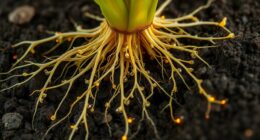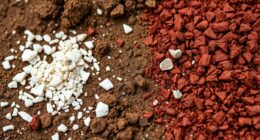Potassium sulfate provides a balanced supply of potassium and sulfur, making it ideal for your crops, especially those sensitive to nitrogen or chloride buildup. It dissolves easily, so you can apply it through irrigation or directly to the soil, ensuring plants get nutrients efficiently when needed. It also supports crop health, yields, and soil sustainability. To explore how this fertilizer can boost your agricultural practices further, keep going for more insights.
Key Takeaways
- Provides a balanced supply of potassium and sulfur without excess nitrogen or chloride, ideal for sensitive crops.
- Enhances crop vigor, disease resistance, and yields, especially for potatoes, tobacco, and fruits.
- Easily dissolves in water, enabling precise application through irrigation or soil incorporation.
- Supports long-term soil health, reduces runoff pollution, and minimizes soil salinity risks.
- Promotes healthy plant development by improving nutrient availability, root growth, and photosynthesis.

Potassium sulfate is an essential fertilizer in modern agriculture, especially when crops need both potassium and sulfur. If you’re aiming for healthy plant growth and high yields, understanding how this compound works can make a significant difference. Unlike other fertilizers, potassium sulfate provides a balanced supply of potassium and sulfur without adding excess nitrogen or chloride, making it ideal for crops sensitive to these elements. When your soil is deficient in sulfur, or when you want to minimize chloride buildup, applying potassium sulfate guarantees your plants get the nutrients they need without risking toxicity or imbalance.
You might find that potassium sulfate is particularly useful for crops like potatoes, tobacco, and fruits, which respond well to sulfur and potassium. These nutrients are essential for various physiological processes, such as enzyme activation, protein synthesis, and carbohydrate metabolism. When your plants receive adequate potassium, you promote stronger cell walls, better drought resistance, and improved overall vigor. Sulfur, on the other hand, is fundamental for amino acid production and chlorophyll formation, directly impacting photosynthesis and plant health. By applying potassium sulfate, you help your crops develop more robust roots, stems, and leaves, leading to more vigorous growth and higher yields.
Another benefit of using potassium sulfate is its solubility. Because it dissolves easily in water, you can incorporate it into your irrigation systems or apply it directly to the soil with minimal effort. This ease of application allows for precise nutrient management, guaranteeing your plants get the right amount at the right time. Additionally, potassium sulfate doesn’t contribute to soil salinity as much as some other fertilizers, reducing the risk of harming sensitive plants or disrupting soil health. This makes it a safer choice for long-term soil fertility, especially in areas where salt buildup is a concern.
Using potassium sulfate also supports environmental sustainability. Since it contains only potassium and sulfur, it’s less likely to contribute to runoff pollution compared to more complex fertilizers. This helps you maintain healthier surrounding ecosystems. Furthermore, because it supplies nutrients efficiently without excess, it can improve fertilizer use efficiency, saving you money and reducing waste. Incorporating potassium sulfate into your fertilization plan can enhance crop quality, increase resistance to diseases, and improve overall productivity. When managed properly, it becomes an invaluable tool in your agricultural toolkit, helping you grow healthier, more resilient plants while protecting the environment.
Frequently Asked Questions
Is Potassium Sulfate Environmentally Friendly?
You might wonder if potassium sulfate is eco-friendly. It’s generally considered environmentally safe because it’s a natural mineral that dissolves quickly, reducing runoff risks. When used properly, it doesn’t contaminate water or soil and doesn’t harm beneficial insects or wildlife. However, over-application can lead to nutrient imbalances. So, you should always follow recommended guidelines to minimize environmental impact and guarantee sustainable use of this fertilizer.
How Does Potassium Sulfate Compare to Other Fertilizers?
When comparing potassium sulfate to other fertilizers, you’ll find it offers specific advantages like providing both potassium and sulfur, which are essential for plant growth. It’s more environmentally friendly than some options because it’s low in chloride, reducing soil and water pollution risks. Plus, it’s quickly absorbed by plants, making it efficient. However, costs and crop needs vary, so consider your specific farming requirements before choosing the best fertilizer type.
Can Potassium Sulfate Be Used in Organic Farming?
Did you know that over 70% of organic farmers prefer natural fertilizers? You can definitely use potassium sulfate in organic farming since it’s considered an approved input by organic certifying agencies. It provides essential potassium and sulfur without synthetic additives, helping your crops grow strong and healthy. By choosing potassium sulfate, you’re supporting sustainable practices while ensuring your plants get crucial nutrients naturally.
What Are the Storage Requirements for Potassium Sulfate?
When storing potassium sulfate, you should keep it in a cool, dry, well-ventilated area away from moisture and incompatible substances. make certain the container is tightly sealed to prevent absorption of humidity, which can cause clumping or degradation. Avoid exposure to direct sunlight and extreme temperatures. Proper storage maintains its quality and effectiveness, making it safe for your agricultural needs. Always follow the manufacturer’s guidelines for ideal storage conditions.
Are There Any Crop-Specific Recommendations for Potassium Sulfate Use?
Imagine a gardener tending to delicate roses; you tailor your approach to each plant’s needs. Similarly, for potassium sulfate, you should follow crop-specific recommendations. For instance, potatoes and fruit crops often benefit from precise application rates to maximize yield and quality. Always check local guidelines or consult with agronomists, as ideal use varies by crop. Properly applied, potassium sulfate helps your crops thrive, much like nurturing a flourishing garden.
Conclusion
Think of potassium sulfate as the secret ingredient in your garden’s recipe for success. It’s like a spark plug that ignites healthy growth, balancing your soil’s nutrients and boosting crop yields. With its dual role as a source of potassium and sulfur, it’s an essential partner in your farming journey. By including potassium sulfate, you’re watering the roots of prosperity, ensuring your plants thrive and your harvest is bountiful—your garden’s true powerhouse.









